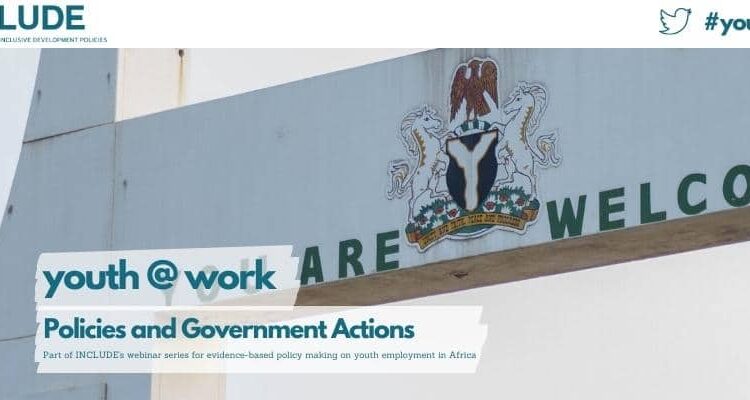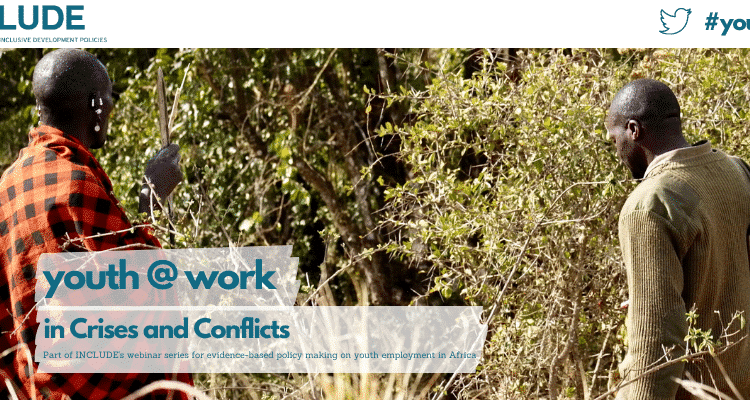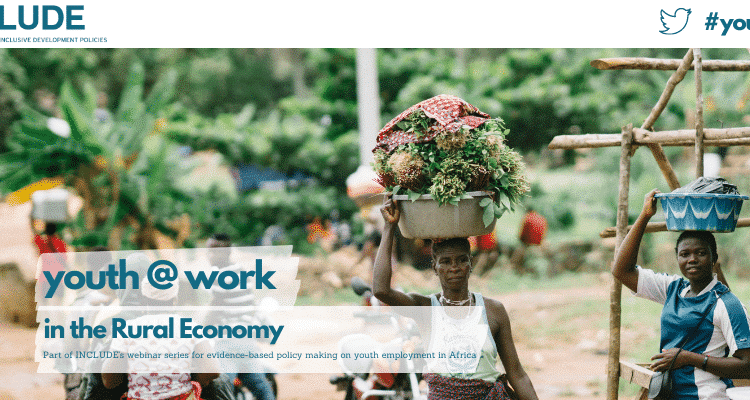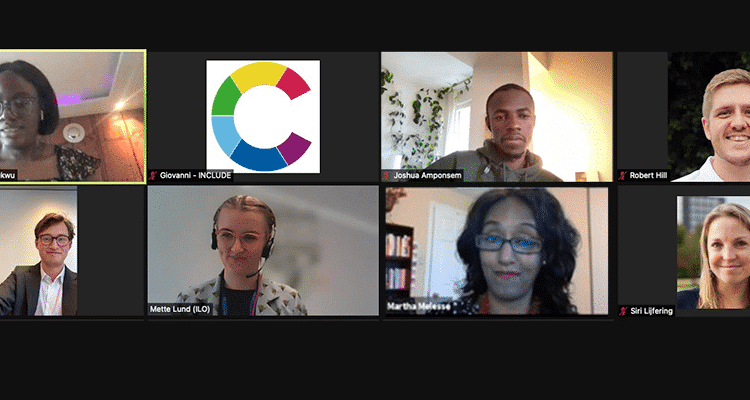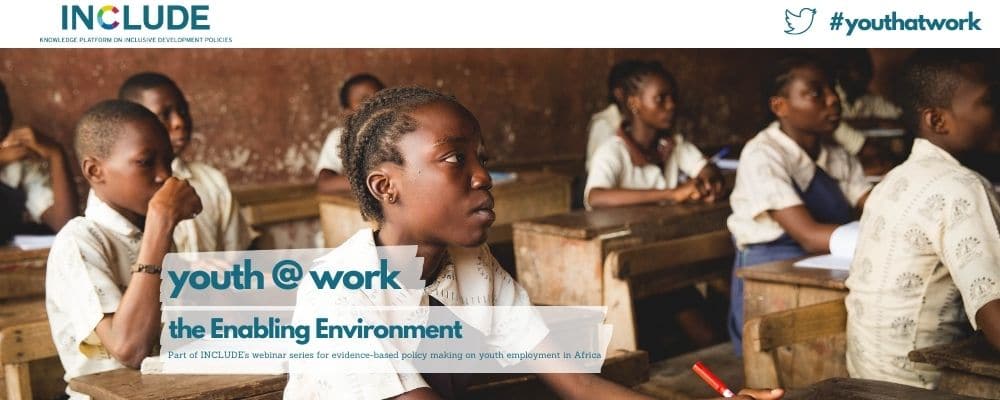
What is an enabling environment and what is its role and impact on employment creation for youth? These were the main questions of this week’s Youth@Work webinar, hosted by INCLUDE, with the support of Canada’s International Development Research Centre (IDRC) and the International Labour Organization (ILO). During the Youth@Work webinar series, researchers, practitioners, policymakers and youth come together to share knowledge and good practices on youth employment in Africa. This article presents the key insights emerging from the online event.
Youth in Africa face a myriad of constraints that affect their access to and success in the labour market. Stimulating youth employment is therefore not only a matter of strengthening individual technical skills and linking youth to a job. Rather, as was discussed during last week’s Youth@Work webinar on the role of the government and policies, it also entails creating an enabling environment that is supported by a coherent and comprehensive policy strategy. This week’s webinar discussion focused on what an enabling environment actually is and what its role and impact is on employment creation for youth in Africa.
Social empowerment as a stepping stone
Marieke Meeske, Impact Measurement and Knowledge specialist at Oxfam Novib, shared some important findings of the evidence synthesis paper on the enabling environment. As research shows, creating an environment for youth to thrive in the labour market needs concerted efforts on both an individual and a systemic level. Personal strengths, such as individual agency and empowerment, as well as an enabling environment that accepts and actively fosters youth employment are in this respect key. An enabling environment comprises of both informal factors, such as social norms and attitudes and formal factors, such as policies and legislation that can support young women and men in the access to and success in the labour market.

Marieke Meeske – Creating an environment for youth to thrive in the labour market needs concerted efforts on both an individual and a systemic level
What Meeske and her colleagues found is that interventions focusing on social empowerment, which includes people’s feelings of autonomy, self-confidence and self-esteem, played a key role in any subsequent labour market or business success. As such, social empowerment can be seen as a prerequisite of economic empowerment, which leads to increased financial independence and freedom to make life choices. Especially for marginalized youth, who are more disadvantaged in the labour market than their peers, a strengthening of their confidence and autonomy underlies the development of the soft skills necessary to gain successful and decent employment.
It is, according to Meeske, also crucial for youth employment interventions to aim to shift social norms to improve the enabling environment, especially for young women. Social norms in communities have a bearing on the possibilities for youth employment and young women in particular are often held back by restrictive norms that limit their opportunities in the labour market.
Engaging women and youth in policy-making
Taonga Zulu, a youth activist on women’s and youth rights in Zambia agrees with Meeske that focusing on social empowerment and changing social norms is key in bridging the gender gap in employment in Africa. In Zambia, the unemployment rate for young women is much higher than the unemployment rate among their male peers. According to Zulu, this has to do with issues such as teen pregnancies and child marriage, but also with the lack of access to education for girls in the country. Especially in rural areas, the participation of girls in higher education is extremely low.

Taonga Zulu – Engaging youth looks good on paper and in impact reports to donors, but when it comes down to it, most organisations put youth in the back of the room and in lower positions, so they don’t have any power when it comes to decision making.
In addition, the work in many sectors is not safe for women to participate in and the requirement of sexual favours in return for employment opportunities are all too often the case. According to Zulu, the government should consequently play a more active role in creating an enabling environment for young women to participate in the labour market by introducing policies that stop gender biases and sexual harassment.
Involving women and youth in the policy discussions and decision-making is in this regard extremely important according to Zulu, to ensure the appropriateness of certain interventions. However, that this is far from common practice is something that Zulu knows all too well. ‘Engaging youth looks good on paper and in impact reports to donors, but when it comes down to it, most organisations put youth in the back of the room and in lower positions, so they don’t have any power when it comes to decision making. If we are serious about youth employment, this really needs to change.’
An enabling environment for entrepreneurship
Laila Bouallouch, who works as a policy advisor on youth employment and the future of work at the department for sustainable economic development at the Netherlands Ministry of Foreign Affairs, wholeheartedly agrees with Zulu that youth deserve a seat at the table of policymaking. In this regard, the Ministry has developed a Youth participatory toolkit which will be launched this coming Monday, 22 November, during the online event – ‘One Year Youth at Heart – Youth in the Lead’.

Laila Bouallouch – Partnerships between the public and private sector and a vigilant civil society, that can amplify the voices of the youth and put pressure on the government are key.
According to Bouallouch, in addition to meaningful youth participation in policy processes, systemic change also requires efficient and effective implementation of these policies; ‘It is nice to have laws, but these can only make a difference if they are enforced’. Bouallouch therefore pleads for the widespread dissemination and understanding of laws and regulations and an effective system to enable their enforcement. However, from her time in Tunis, Bouallouch learned that the enforcement of certain laws and regulations can actually have an adverse effect on stimulating decent work for youth. In this regard, Bouallouch shared the example of a law regulating prices of milk and wheat that actually pushed entrepreneurs back in the informal economy as formalising wasn’t a viable economic option anymore. Partnerships between the public and private sector and a vigilant civil society, that can amplify the voices of the youth and put pressure on the government, are therefore key when it comes to creating an enabling environment for youth employment, according to Bouallouch.
Sharing his experience from Algeria, Abdellah Mallek, founder of Sylabs, an entrepreneurship and technology hub, underscores Bouallouch’s point about the importance of sharing knowledge about laws and regulations. In this regard, it is key, according to Mallek, that the information is not only made available, but also accessible. ‘Policy documents and reports on laws and regulations are often very long and not written for a wider audience. If you want entrepreneurs to read it you should ask them what they want to know and take that as a starting point.’

Abdellah Mallek – To create jobs in the long run it’s important to support entrepreneurs both from the inside out, by focusing on empowerment and skills development, and from the outside in, by creating an enabling environment for them to thrive
To help entrepreneurs navigate the labour market, Mallek started the Sylabs Accelerator programme in 2018. ‘The accelerator is a micro-climate for small and medium enterprises (SMEs) ’, he explains. ‘It provides a safe environment for entrepreneurs to learn and grow before going out into the market’. According to Mallek, this can help entrepreneurs see where the gaps are and where support is most needed. According to Mallek, to create jobs in the long run it’s important to support entrepreneurs both from the inside out, by focusing on empowerment and skills development, and from the outside in, by creating an enabling environment for them to thrive.
The bigger picture
Although he agrees with Mallek and Bouallouch that creating jobs requires investment in an enabling environment for entrepreneurship, Chibuke Uche, chairholder of the Stephen Ellis Chair for the Governance of Finance and Integrity in Africa at the Africa Study Centre in Leiden, warns that we have to put these developments in perspective and have to look at the bigger picture of the labour market. ‘SMEs are not an end in itself, but are part of value chains of larger companies, in many cases multinational enterprises (MNEs)’, Uche elaborates. ‘What research shows is that in places where there are successful MNE’s, small businesses also thrive’. Taking a holistic perspective is therefore key when it comes to stimulating youth employment, according to Uche.

Chibuike Uche – When it comes to creating employment in Africa, we cannot leave it to free market policies
In this regard, Uche gives the example of Dutch multinationals Heineken and Friesland Campina. Both have huge operating facilities in Africa, but still import most of the raw material from Europe, which means that most of the jobs along the value chain are also created there. Nigerian cement conglomerate Dangote also still imports most of its labour force from outside of Africa and is planning to store the lions share of its investments in Europe.
According to Uche, to stimulate youth employment in Africa it’s important to convince these companies to invest in the development of local value chains and hire youth from the local labour force. This requires creating conducive local conditions regarding tax and labour laws, research and development, an affordable and good labour force, and other issues that improve the so-called ‘ease of doing business’ for companies. ‘In the end businesses all dance to the tune of local economic space, so that’s where the opportunities for change lie.’
‘When it comes to creating employment in Africa, we cannot leave it to free market policies’, concludes Uche. ‘We have to also look at what African governments can do to create an enabling environment for businesses to thrive. Change can come to Africa, but it has to come from the inside.’
